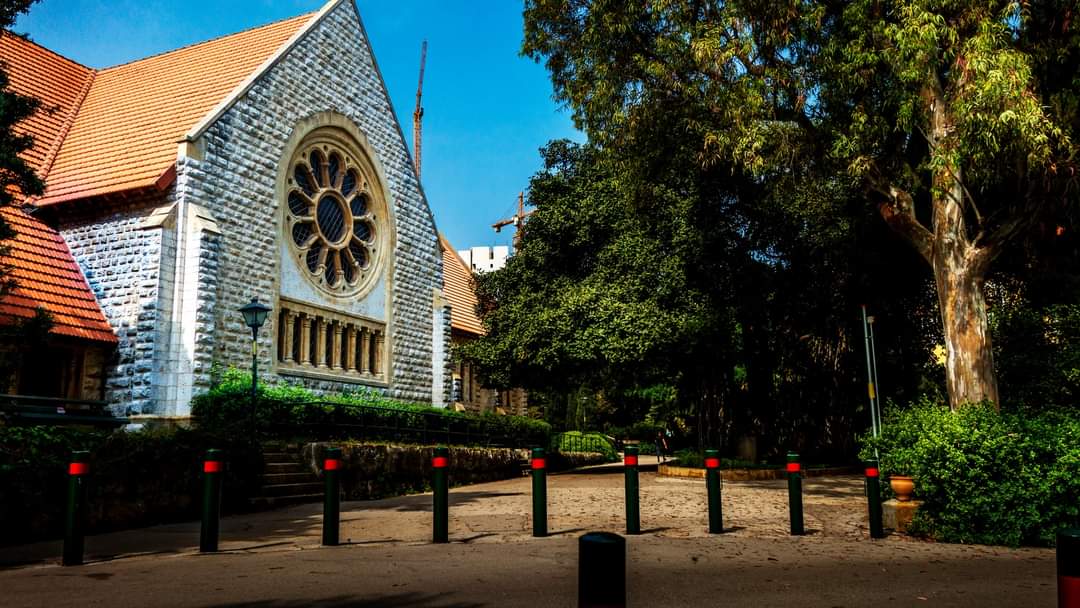In 1965, I was accepted into AUB. For my family this was a source of pride, as I was seen to be following in the footsteps of my father, uncles, grandfather and my great maternal grandfather, Naoum Moughabghab, one of the five students who, in 1870, had become the first graduates of the Syrian Protestant College.
Stepping into AUB’s campus was very much like the paratrooper who plunges from an aircraft into open space. The gush of air was exhilarating and walking in from Bliss Street, with its Uncle Sam, Faisal Restaurant, Khayat Bookstore and Bikhazi Canteen, signaled the beginning of a new journey of discovery.
I entered AUB almost alone, as most of my secondary school friends had gone in different directions after graduation. I fell in love with the university grounds instantly and, unlike other freshman students, my fascination was amplified by the variety of trees and the copper plates nailed to their stems carrying their Latin names. Washingtonia Filifera, Pinus Halepensis and Cidra Libani are names that I continue to remember to this day.
Walking into College Hall was a scene I had been drilled to expect, having waited for my father under the arch of its entrance while he visited my aunt’s husband, Farid Fulaihan, the university’s registrar, whose name had always terrorized old and new students alike. The registrar was not influenced by any ties – family or other – and I personally experienced an overdose of his wrath the semester I was placed on “probation”.
Dodge Hall was one of my preferred buildings, as the post office in its basement boosted my ego. It provided me with a mailbox of my own that allowed me to check the mail as I arrived on campus every morning. I would read through the university circulars, including tuition fee reminders, as well as letters from my secondary school friends who had left for England and Germany to complete their studies. Next to the post office was the university store, managed by the Nassif brothers, from which I bought grey cotton sweatshirts, yellow paper notepads and index cards that oozed with the scents of America.
On the ground floor of Dodge Hall was the AUB Milk Bar, which was my preferred hang-out for a cup of American coffee and a cinnamon roll – a new culinary experience that would influence my morning snack habit for many years to come.
On the ground floor of West Hall, I experienced my first university registration, having to choose the courses I would like to take while at the same time calculating the credits needed for graduation in normal time. I also learned of the teachers giving the different courses and came to know how to drop courses and replace them. Also on the ground floor were the offices of Outlook, the students’ weekly journal, which I became an avid reader of. Its general knowledge competitions initiated me into the skills of research and the art of learning beyond textbooks. In my senior year, Outlook would play an important role in my life, which we will get to later.
The cafeteria, the green oval in front of Fisk Hall, the newly completed Nicely Hall, the infirmary, and the green field; all became part of my new world, the horizons of which were broadened by the freshman’s cultural studies. New friends were made with a twist of diversity. AUB during those days was the educational dream of Arab youth, not only from the oil-rich Gulf states, but also from Africa and, to my surprise, from Europe too. My circle grew to include students from my own community, mainly the Ras Beirut crowd who came from families that had been close to mine for ages. But we also had Saudi, Bahraini, and Kuwaiti friends from both sexes, and now I realize that these friendships prepared me for a move into the Arab world (when I went into business) without any hesitation. All in all, life on campus was lovely and it continued to be enhanced by the fact that wherever I moved, I was always overlooking a vast stretch of the Mediterranean.
Sadly, things at home were not as good. My father’s pharmacy business was suffering to the extent that he had to take on a partner. This brought home to me the problems of the real world and my first attempt at cutting down on university expenses was to not buy the books for my second semester courses, but to use those books at Jafet Library to prepare. This meant that I spent more time in the Stacks than in all the other more pleasant places on campus. I also rushed back to Aley, where at the weekends I helped my dad and his new younger partner at the pharmacy. There I realized how frustrating it was for a licensed pharmacist to compete with a street-smart young entrepreneur who had received a financial boost from his elder brother, and who worked hard to prove that his management style was better for a healthcare institution that had built its reputation on helping people all over Al Gharb and Chouf regions.
In my sophomore year I arrived at the conclusion that I needed to spare Dad my AUB tuition fees, and consciously I started planning to put an end to my own days of abundance.

